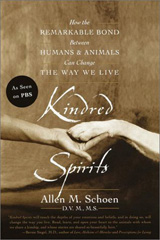Profile
 Listen
to the Animals Listen
to the Animals
A veterinarian shows how animals can change our lives
A man suffering from heart disease improves when his Scottish terrier
is allowed into his hospital room. An abused woman, through the
act of applying acupuncture to her horse, learns not to fear human
touch. These are just a few of the many stories of co-species bonding
recounted by Dr. Allen M. Schoen in Kindred Spirits: How the
Remarkable Bond Between Humans & Animals Can Change the Way
We Live.
Schoen, an adjunct professor at the Tufts Veterinary School, believes
that the relationship between humans and animals is an integral
part of our lives and one that can improve the world around us.
"Animals teach us how to slow down and live in the moment,"
he says. "They give us unconditional love; they accept us for
who we are. If we take that love that we get from them and we expand
it to all other beings everyday, it's going to be a better world."
In return, humans can do something for animals. People talk about
how much their animal companions (he prefers the term companion
over pet) love them, yet they forget that returning that
love is just as important to animals. "A human's love for an
animal can be just as powerful as some modern medicines," Schoen
says.
As a young boy growing up in Queens, Schoen knew that he wanted
to work with animals. But entering veterinary school in the early
1970s, he was shocked at the clinical approach most doctors took
toward the animals they were treating. He himself was often reprimanded
for showing too much compassion. But he persevered and along the
way learned to incorporate non-traditional treatments in his practice,
such as acupuncture and herbal remedies, which helped to improve,
and in many cases save, the lives of the animals he treated.
Schoen describes himself as an "integrative, holistic veterinarian,"
a label he still feels is limiting. His perspective on healthcare
goes beyond treating a particular disease. "It's looking at
the whole environment and looking at all options of treatment,"
he says.
The book opens with Schoen visiting a farm late one winter night
with his aide, Megan, to help a birthing cow who is in trouble.
Schoen is halfway through the story before the reader realizes that
Megan is actually a golden retriever who accompanies him on rounds.
The title of the book, Kindred Spirits, refers to the connection
between humans and animals that is so crucial in Schoen's view.
"It's a connection with all other beings that goes beyond the
superficial mental connection and goes right to our heart space.
We're all variations on a theme. Instead of constantly butting heads,
we should stop and recognize that we are all kindred spirits."
This co-species connection, he feels, is vital to our survival.
In a world that is becoming more urbanized and run by technology,
our lives are moving faster and becoming more stressful. "Animals
bring us back from our minds into our hearts. We help each other
heal and that is more important to our survival now than ever."
One of the questions that he is asked most often, and which he
addresses in the book, is how can one become a kindred spirit. "Listen
to your animal friends," he says. "It's amazing what you
start hearing from them if you just listen. We can all be a little
like Dr. Doolittle; it's not restricted to Eddie Murphy."
In addition to the stories Schoen shares, the book contains valuable
information on various alternative treatments. Yet he stresses that
sometimes traditional Western medicine is the appropriate choice.
The most important factor is to have confidence in a veterinarian.
Ideally, a veterinarian should be open-minded about looking at all
therapies. "If they frown on your questions," he says,
"make sure to explore all options for your animal friend."
In the end, he hopes that the book creates a eureka moment in
readers, "a call to action to take our love of animals to an
active level."
"It has been documented in studies that animals can help
heal people," he says. "If all of that could be put into
one pill, we'd have the closest thing to a magic bullet to heal
ourselves and our planet."
--Michele Gouveia
top
|





